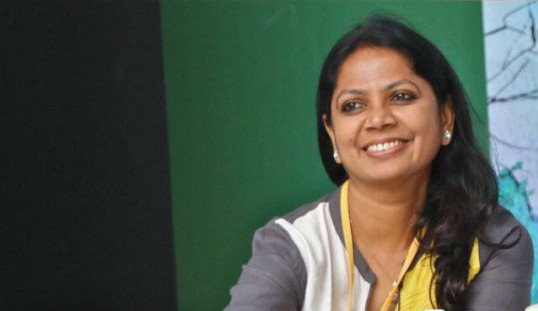We’re thrilled to present the sixth and final installment of our Indian Languages Special Feature here at the blog. This time, Assistant Managing Editor Janani Ganesan gives us an inside look at the life of the featured poet via the following interview. Thanks for sticking with us on our tour of the language-rich Indian subcontinent!
Images of writer Salma receiving honours and awards from Chief Ministers and Presidents line the living room walls of her Chennai flat. It’s the home of an acclaimed public figure, but she has fought to be able to declare this success as a writer, even to herself. Having grown up in an orthodox Muslim community in the southern Indian state of Tamil Nadu and married at nineteen into a conservative family, Salma had to hide her identity as a writer. Her years of struggle as an imprisoned woman are well recorded, including in an award-winning documentary by Kim Longinotto. Her poems, short stories, and novels are deeply melancholic reflections on life as a woman in her culture. “I don’t think I have ever felt happy. Not even when I receive recognition for my work. I always feel a sense of sorrow, having lost a lot,” she said during our interview.
“How did you reach my apartment? Did you take a taxi?” she asks. My scooter gets a nod of approval. “Parava illaye!” [“Not bad!”] A woman must have mobility. She sits down with a newspaper upon which she cleans and removes spinach leaves from their stems to prepare lunch, while we speak about her life and art. Later, she takes a picture with me and the spinach as a rebuke to Tamil writer B. Jeyamohan, who once insulted a bank teller, suggesting she was not capable even of picking spinach leaves.
Below is an edited transcript of the interview, translated by the interviewer and Asymptote’s Assistant Managing Editor, Janani Ganesen, as well as one of Salma’s poems, translated by N Kalyan Raman.
Janani (J): Your life and struggle has been widely recorded. Yet, for the sake of our readers, I hope you wouldn’t mind answering a few questions. You grew up in a cloistered environment. How did you access books?
Salma (S): There was a library in my town that I liked going to. It wasn’t big, but I read as much as I could. In those days, New Century Book House used to bring out translations of Russian writers. I read Dostoevsky, Tolstoy, and others. I read and admired Tamil writers like Balakumaran. But it is from these Russian greats that I got a sense of what literature is about. I also read Periyar and wondered, “Why am I not being allowed to go to school or do the things that my brother is allowed to do? How am I different?” I felt angry.
J: When did you start writing?
S: Although I wrote my first short story when I was in class seven, I wouldn’t look at it as my beginning. It was about a woman, whose husband abandons her and yet she goes back to help him when he is in need. I was influenced by the movies I watched and what older people told me: “Kallanalum Kanavan.” [“A husband remains a husband even when he is hard like a stone.”]
I would say my writing career began with the publication of the poem “Swasam” [“Breath”] in a little magazine called Suttum Vizhi Chuddar, when I was seventeen. I received a lot of reviews only after that poem.
J: What is “Swasam” about?
S: What is my identity? Things were happening around me without my being aware of it. My breath should be mine. Somebody else can’t breathe on my behalf. But that was how it was. Everybody else was deciding the course of my life. My education, my activities, my movements, my marriage, all of this was decided by someone else. That’s what the poem is about. The poem became controversial in my village. “How could you let a girl who has attained puberty let her name be printed? It’s a disgrace for her to show her face outside. A disgrace to the family. A disgrace to her society,” they said. I didn’t understand this then. Why could you not print my name? A girl’s name is printed in a marriage invitation; is that a disgrace too? But I couldn’t argue with them.
READ MORE…


